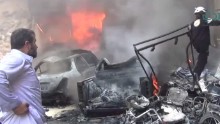Syrian rebels express ceasefire 'reservations' after deadly spate of bombings
After months of negotiations and an eleventh-hour failure to reach an agreement, Russia and the US have finally settled on terms for a Syrian ceasefire -- due to start at sundown on Monday -- and have even secured buy-in of the country's recalcitrant leader, President Bashir al-Assad.
The cessation of hostilities is a beginning of an at-least temporary letup in the bloody, seemingly endless conflict in Syria, and a chance for some much-needed humanitarian respite for the hundreds of thousands of embattled Syrians who endure this civil war.
But given the failures of the past, some Syrian groups say they are hesitant to embrace the truce agreement, saying that they have are wary of any agreement that doesn't cover all besieged areas of the country.
A representative of a Free Syrian Army (FSA) group called Fastaqim Union tells CNN the group sent a message to the United States expressing several "reservations" over the deal, which is to coincide with the start of the Eid al-Adha festival.
"We also have reservations about targeting (Islamist rebel group) Jabhat Fateh al-Sham because we think that targeting them will be in the favor of the regime. We don't trust the regime and there are no actions that will be taken in case the regime violates the truce," FSA representative Zakaria Malahfki said.
The Syrian government announced its support of the ceasefire deal Saturday, according to the state-run broadcaster.
US Secretary of State John Kerry said the accord, announced after hours of talks in Geneva, would prevent Syrian President Bashar al-Assad's air force from flying combat missions anywhere the opposition is present, calling this provision the "bedrock of the agreement." He labeled the Syrian air force the "main driver of civilian casualties" and migrant flows.
Malahfki added that he had not received a response from the US government. CNN has contacted US officials for comment.
Inside Jarablus: What happens when ISIS loses control of a city
Bloody weekend
More than 90 people were killed in airstrikes that rained down on northwestern Syria on Saturday and Sunday, a rights group said. The surge in violence came just hours after the US and Russia announced a new ceasefire plan.
The airstrikes landed in the rebel-held areas of Idlib in the northwest and Aleppo in the north of the country, according to the monitoring group Syrian Observatory for Human Rights.
The worst strikes were in Idlib, where at least 61 people were killed and more than 100 wounded in an attack that targeted a crowded market, an activist who witnessed the bombing and its aftermath told CNN.
The activist, who asked to be identified as Omar for security reasons, said he was in Idlib to cover the atmosphere a day ahead of the Eid al-Adha holiday. Omar took a detour to the city since the roads near the markets were closed as a security precaution, and that probably saved his life, he said.
"We heard a whistling sound then the explosions," Omar said. The jets arrived around 12:30 p.m. local time, he said. "Two or three rockets landed in middle of the market. We left the car where we were and headed towards the site of explosion."
Omar said Syria Civil Defense teams couldn't reach the site quickly because of the road closures.
"We carried 30 people dead from the ground and we transferred some other 40 injured. Their injuries varied," Omar said. "Those injured, they were clear and visible on the ground and not hidden behind cars or inside rubble. We carried them and started taking them to field hospitals. This is when the civil defense rescue teams started arriving and carrying and helping the injured as well the ones trapped under the rubble."
Omar said the field hospitals were overwhelmed.
Video from the scene showed White Helmet rescuers -- the nickname for Syria Civil Defense volunteers -- carefully squeezing beneath piles of stones to look for victims. Cries of "Allahu-Akbar" filled the air when the rescuers found a victim alive and pulled them out to safety.
Skepticism over deal
After five years, Syrians are weary of a war that has left more than 250,000 dead and forced nearly 5 million to flee the country. But many activists and Syrians, especially those living in rebel-held areas, remain skeptical of the latest peace deal.
"It's in the general interest of the Syrian people to stop the rivers of blood, and stopping bloodshed is the first step," said one Syrian in Aleppo. "It's a good step, but what's the guarantee that it will remain in place?"
"This is the best option of all bad options," said Fawaz Gerges, speaking to CNN's Becky Anderson on Sunday. Gerges is the chair of contemporary Middle East studies at the London School of Economics, and the author of "Isis: A History."
Gerges said the big question is whether the guns that are scheduled to fall silent Monday would remain silent in the weeks and months ahead.
"The reality is where do you go from there?' he said. "The reality is the balance of power favors Assad at this particular moment."
News Courtesy: www.cnn.com











